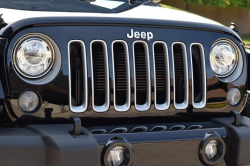— A Jeep Wrangler heater core replacement lawsuit is being challenged in court by Chrysler as the automaker told the judge the class-action lawsuit should be dismissed.
The 2012-2017 Jeep Wrangler heater core lawsuit alleges radiator sludge caused by leftover casting sand in the cylinder heads circulates through the heating and cooling systems, causing the sand to settle in the radiators, oil cooling systems and heater cores.
The named plaintiffs say that repairs cost more than $1,000 to replace the affected parts, but no matter how much maintenance is routinely performed on the Jeeps, the problem allegedly continues.
Wrangler owners describe losing the heat because of sand-like residue blocking the systems, sometimes causing multiple trips to dealerships. Common complaints include losing the heat on one side of the vehicle or feeling less heat on one side.
Other owners have reported finding as much as three inches of sand in the radiator overflow tanks and having to replace the heater cores numerous times. Some Jeep owners say dealers tried to flush the radiators and systems after finding sand and sludge in the coolant, only to leave the dealer and later find more sand in the discolored coolant.
The lawsuit alleges the only way to completely repair the problems is to replace the engines.
One plaintiff claims his 2013 Jeep Wrangler Sport heater wasn't working correctly when the vehicle had only 17,000 miles on it, but he endured the problem until 2017 when the Wrangler had more than 46,000 miles.
His dealership told him the heater core was blocked and the $1,500 repair job wouldn't be covered under warranty because the warranty had expired at 3 years/36,000 miles.
The Jeep Wrangler lawsuit alleges Fiat Chrysler (FCA) should have known about the casting sand and heater core problems in 2011, before the SUVs were first sold. But at the latest, Chrysler allegedly must have known as early as June 2012 because of customers complaining about the heater problems.
Chrysler says the claims of the lawsuit are implausible because the "plaintiffs bring this case even though neither of them is able to allege that he knows his own vehicle actually had a ‘sludge-like residue.’ Nor is either of them able to allege that any sand was ever found in his own vehicle.”
The automaker also told the judge that the plaintiffs don't seem to even know the facts about their own vehicles, yet those owners "seek to impose massive liability on defendant FCA US LLC under various theories.”
Chrysler says the plaintiffs don't provide enough proof to show they suffered injuries caused by the automaker breaking laws.
Chrysler went straight to the heart of the matter with one plaintiff who allegedly never said that anyone ever witnessed sludge in the Wrangler, and according to Chrysler, the plaintiff apparently didn't even know if sand and sludge had been building up in the SUV. With another plaintiff, FCA says the heater core was never even replaced because the plaintiff decided against it.
Chrysler says although the plaintiffs complain about problems, those alleged problems could be caused by various different conditions.
The plaintiffs also argue the warranties on the Wranglers are "unconscionable" because they include time or mileage limits, a claim Chrysler says is nonsense.
The automaker also points out how the plaintiffs admit the warranty coverage on their vehicles expired before the vehicles were first taken in for repairs to the heating and cooling systems. In addition, bringing up talk about a 5-year powertrain warranty is meaningless because that warranty doesn't include heater cores.
Chrysler argues in its motion to dismiss that claims of violating the Magnuson-Moss Warranty Act should be tossed out because even if the automaker knew a defect may exist, the Warranty Act does not require a company to disclose a defect. According to FCA, the Act only forces the automaker to completely disclose the terms of the warranty, which Chrysler says it did.
The Jeep Wrangler heater core replacement lawsuit was filed in the U.S. District Court for the Southern District of New York - Malizia et. al. v. FCA US, LLC.
The plaintiffs are represented Greg Coleman Law PC, Simmons Hanly Conroy LLC, and Whitfield Bryson & Mason LLP.

